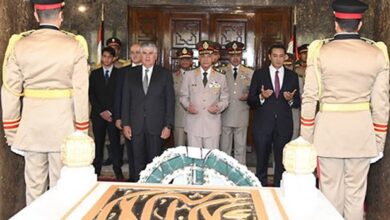For decades, Egypt has been crumbling under flawed constitutions that sanctified authoritarian rule and concentrated all powers in the hands of one person. As the country is at a critical juncture that may mark the beginning of a genuine democratic transition, the debate on Egypt’s constitutional future heats up.
Earlier this week, the Supreme Council of the Armed Forces dissolved the parliament and suspended the constitution, entrusting a legal commission with amending some constitutional provisions. The eight-member legal panel is expected to modify articles 76 on eligibility conditions for the presidency, 77 on the number of terms a president can serve, 88 on judicial oversight of elections, 93 on the parliament’s exclusive right to decide on the validity of the membership of its members and 189 on the mechanism to amend the constitution. The commission is also expected to abolish the notorious article 179 that allows the infringment of personal rights under the pretext of combating terrorism The army also said that other constitutional articles could be modified to pave the way for fair elections.
Many opposition voices, including young revolutionaries, earlier called on the army to repeal the 1971 Constitution altogether to open the door for a completely new one. But the military said that process would take too long.
“I wish we could draft a new constitution,” said reformist Justice Hisham al-Bastawisy, “but the armed forces are rushing to transfer power to a civilian government, which is a good attitude. So we have to deal with this reality.”
One more article needs to be added to the list of amendments, said al-Bastawisi. “Article 75 must be changed to stipulate that the presidential candidate cannot be older than 70 years old. This is the maximum age for retirement. It is impossible for someone to start a presidential career after 70,” said al-Bastwisi, vice-president of the Cassation Court.
The current article sets the minimum age for eligibility at 40 years. It also stipulates that the candidate should be born to Egyptian parents and should enjoy civil and political rights. The constitution allowed Mubarak to rule for 30 consecutive years, resigning at the age of 82 due to mass pro-democracy protests. During the last decade, opposition forces questioned Mubarak’s ability to assume his duties given his age and deteriorating health.
“As to article 76, there should be no restrictions on the candidacy other than the ones mentioned in article 75. Any citizen should have the right to run,” al-Bastawisi also said.
In 2005, Mubarak stirred unprecedented debate by making sweeping amendments to that article. The changes ostensibly introduced multi-party presidential elections for the first time in Egypt. But the devil lay in the details of the modified provision. It laid out draconian restrictions on candidacy to make it impossible for any politician from outside the ruling National Democratic Party (NDP) to run.
Regarding election monitoring, amendments should stipulate that each ballot box must be monitored by one judge, added al-Bastawisi, who has fought resiliently in the past for the independence of the judiciary and fair elections.
The raison-d’etre of most upcoming constitutional reforms is to ensure fair and free presidential elections during the six-month transitional period. Yet opposition parties say that more articles need immediate modifications to curb the limitless authority of the president and eradicate the deep-rooted legacy of patriarchal rule.
According to Ali al-Salmi, assistant chairman of the liberal Wafd Party, at least 20 constitutional provisions must be modified.
“We have to make sure that the new president will have no chance to repeat what was taking place before,” said al-Salmi, adding that current constitutional order had turned rulers into “Pharaohs that no one can question.”
Many articles in the Egyptian constitution are dedicated to the president’s functions and his relationship with other branches of government. The President of the Republic serves as both Head of State and President of the Executive branch, in charge of setting the state's general policy and supervising its implementation. He appoints prime ministers, his deputies and all ministers and their deputies, and holds the right to relieve them of their posts. Additionally, the Head of State presides over two major sovereign bodies, as Supreme Commander of the Armed Forces and Supreme Chief of the Police Authority. On the legislative front, the constitution grants the president the right to pass and veto laws. There is no clear balance of power between the head of state on one hand and the legislative and the judiciary on the other.
Despite these sweeping powers, the president is not held accountable to the legislative branch. The parliament can impeach the president only if he is convicted of "high treason" or a criminal act. On the judicial front, the head of state presides over the Supreme Council for Judicial Bodies, the council in charge of supervising the affairs of the judiciary. In practice, the president is the one to appoint the heads of the nation's six judicial bodies including the public prosecutor, the president of the Constitutional Court, the president of the State Council (Maglis al-Dawla), the president of the Court of Cassation (Egypt's highest appellate court), the president of Administrative Prosecution Body and the head of the State Cases Authority (the body that represent the state in legal matters).
In 2007, Mubarak’s regime introduced a set of amendments allegedly meant to empower the parliament by allowing it a stronger say on certain matters. Yet the same package of changes gave the president more leeway to dissolve the parliament.
”The president’s powers have to be curbed to pave the way for a parliamentary republic,” said al-Salmi.
In recent days, many opposition parties as well as youth-based revolutionary groups have argued that the democratic transition should lead to a parliamentary system.
In parliamentary systems, the head of state is a ceremonial leader with nominal functions. That person can be a president or a monarch and may be elected by either the parliament or the people. The prime minister is the chief executive. The prime minister and the cabinet should come from the party that wins the majority in parliament. The British government serves as the best example of parliamentary models.
But this model might not be a matter of consensus in Egypt.
“The parliamentary system needs strong parties. Do we have that in Egypt?” Ahmed Mekki, another vice president of Egypt’s Cassation Court, asked rhetorically.
With Egypt’s frail parties, a parliamentary system might sow the seeds of “a dictatorship of the majority”, added Mekki. “The parliamentary system requires a strong and stable party system so that the ruling party will be facing strong opposition from other parties,” he explained.
Despite its 24 political parties, Egypt serves as a classic example of a single-party system. For decades, the NDP monopolized power and employed a number of tactics to weaken other parties. Adversary parties had to live with an arsenal of restrictive laws that limited their ability to build a strong support base. They never succeeded in garnering a significant representation in parliament due to both their internal divisions and the regime's vote rigging. In the outgoing People’s Assembly, opposition parties hardly held 3 percent of the contested seats.
For Mekki, Egypt will have to come up with a mixed model that derives elements from both presidential and parliamentary systems. In that system, a stronger balance of power should be struck between the president’s duties and the parliament’s authority, explained Mekki.
In parliamentary systems in which no party can win a majority of seats, divergent parties end up forming coalition governments. In some countries such as Israel, such coalitions have been recipes for political instability. But this argument did not sound alarming to al-Salmi.
“The drawbacks of the parliamentary system are less harmful than the disadvantages of concentrating power in the hand of one person,” said al-Salmi.
“Democracy is self-corrective: it will ensure the rise of strong parties that can eventually obtain majorities… Plus, the parliamentary system is not alien to Egypt. The 1923 Constitution established a parliamentary system that lasted for many years."
Prior to 1952 revolution, Egypt was a parliamentary monarchy in which the king had sovereignty but the elected prime minister was theoretically the actual ruler. However, the helm of state swung between three players: the king, the government and the British occupation forces. After the military coup, this system was abolished and power went into the hands of the Revolutionary Command Council. During his presidency, Gamal Abdel Nasser's regime promulgated several constitutions that concentrated power in the president's hands.
Egypt's current constitution was passed under President Anwar Sadat in 1971. In 1980, Mubarak’s predecessor amended the constitution to allow the president to stay in office indefinitely and make Islamic Sharia the primary source of legislation.
The army-appointed commission is expected to report the proposed amendments to the army by the end of this month. And while certain changes are expected, there will be much more constitutional debate to follow as the nation decides what political model post-Mubarak Egypt will follow.




